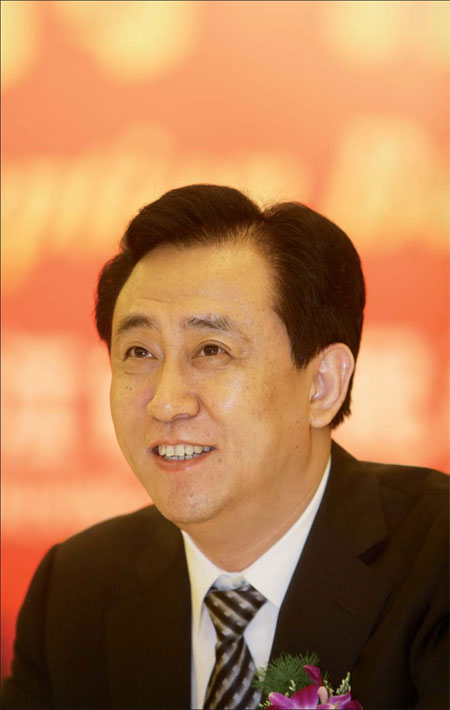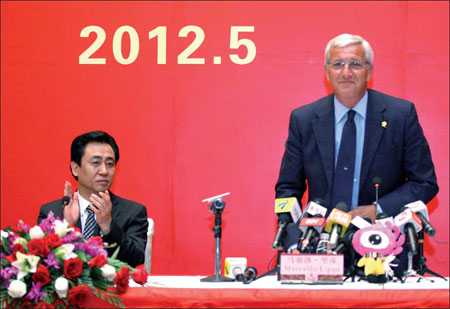Lofty goals and ambitions
Updated: 2012-07-27 12:15
By Qiu Quanlin (China Daily)
|
|||||||||||
|
For Hui Ka-yan, bringing top soccer names to China means a good investment and a springboard for his company's globalization. Zhang Peijian / for China Daily |
|
Hui Ka-yan's Guangzhou Evergrande soccer club signed the World Cup winning soccer coach Marcello Lippi (right) in May. Provided to China Daily |
A businessman who has made a mint from real estate is making a name internationally - on the soccer field
For sports agents the world over in the past few months, Hui Ka-yan has become a name they cannot ignore since the Chinese property tycoon signed the World Cup winning soccer coach Marcello Lippi and his entourage for a reported 10 million euros ($12 million) a year in May.
If that was not enough, in early July Hui signed the young South Korean player Kim Young-gwon, widely regarded as one of the most promising soccer players in Asia.
For a smart businessman like Hui, the fifth richest Chinese with wealth of 46 billion yuan ($7.2 billion, 5.9 billion euros), bringing top soccer names to China means a good investment and a springboard for his company's globalization.
Evergrande Real Estate Group of Guangzhou, of which Hui is chairman, has become one of the largest real estate developers in China, with 80.4 billion yuan in sales last year. Meanwhile the soccer club, Guangzhou Evergrande, is on top of the country's domestic league table after 17 rounds of competition this season.
At university, Hui studied engineering and worked for 10 years at a steelmaker in his home province of Henan after he graduated in 1982.
In 1992, encouraged by the call of the late Chinese leader Deng Xiaoping for economic reform in the country, Hui left the State-owned factory where he was general manager and went to Shenzhen, which borders Hong Kong and which was in effect on the frontline of the country's reform and opening-up.
After working in sales and administration for five years, Hui started his own property company in 1997.
Although Evergrande has become well known as a real estate company in China, it has only been internationally known since Hui drew some of the best international players and coaches, including the former Italian national coach Lippi, the former Brazilian league player Dario Conca and the former Borussia Dortmund striker Lucas Barrios, to the soccer club.
"We have developed at a very fast pace in the real estate industry. The investment in soccer and other cultural sectors serves strategic needs in developing the group," Hui, 54, says.
"We are also trying to make profits from our investment in those areas."
Citing the club's signing of Kim, Hui says the club has always given priority to the commercial value of the players.
"The strategy of signing up players should be based on a potentially successful commercial operation," he says.
After playing for FC Tokyo and Omiya Ardija in Japan for nearly three years, Kim, 22, joined Guangzhou Evergrande on a four-year transfer deal worth $2.5 million on July 2.
Kim is a member of the South Korean Olympic team for this year's London Olympics, and had 23 appearances with FC Tokyo in 2010 and 40 appearances with Omiya Ardija in 2011-12.
"If we spend about $3 million to bring in a player, he should be worth $5 million when he leaves the club," Hui says.
In another transfer, Renato Morais, who came to Guangzhou Evergrande from the Brazilian club Botafogo in a deal worth $2.25 million on March 8 last year, was sold to the Japanese club Kashima Antlers in June.
After joining the Guangzhou club, Renato, 27, was leased to the Brazilian club Ponte Preta for $600,000 a year, sources with the official website of Guangzhou Evergrande said.
That would mean that the one-year lease, combined with the transfer deal with Kashima Antlers worth $2 million, has enabled Guangzhou Evergrande to pocket profits of at least $350,000 from Renato.
"We may not make a profit in the first one or two years after we sign a player, but we should try to make money after the player has been with the club for two years," Hui says.
His idea of making profit from the game is demonstrated in the operation of a soccer school, a cooperative project between Guangzhou Evergrande and the Spanish club Real Madrid, which opened in April.
After winning the Chinese Super League title last year, Hui says the club has more goals beyond the championship.
"We are not only trying to defend the domestic title. We also have a long-term strategy: to develop our own soccer stars through the soccer school."
The school, in the city of Qingyuan in Guangdong province, has started recruiting students aged 7 to 11, and the plans call for it to have 3,150 students in its initial phase beginning on Sept 1.
Since Hui's company took over the Guangzhou club two years ago, it has been dubbed "an international squad", reflecting the fact that it has fewer local players.
But Hui says the club is not only importing international stars.
"As a club promoted to the top domestic league two years ago, we are also thinking of developing our own stars."
Under Hui's plan, students will be able to play in domestic and Asian under-13 competitions, both in the male and female groups, after three years at the school.
Real Madrid will send at least 15 coaches to the school by September, and more assistants will be selected in China, sources with the club say.
"The ultimate goal is to develop real Chinese soccer talent," Hui says. "And we, with our partners from Spain, are confident about the school."
Before taking over the Guangzhou soccer team, the company invested 20 million yuan to develop China's first professional volleyball club in Guangdong in 2009.
The club was promoted to China's top volleyball league in 2010, after it won the championship in the second-tier league in 2009-10.
The club's head coach is the retired national team member and former US women's volleyball team coach Lang Ping, and several other national team players have worked with Guangdong provincial sports bureau to develop young volleyball talent.
As the company has spent increasingly large amounts outside real estate in recent years, some have raised questions about the way the group is run. After Citron Research recently raised questions over information given by Evergrande, its shares slumped.
Hui retorted that Evergrande had a well-balanced investment strategy.
"Compared with investment in the real estate industry, which is our main business, spending in the sports and music sectors is still small," he says.
Investment outside real estate is based on the company's long-term strategy, he says.
"The investment in sports and entertainment accounts for only a small proportion of the group's total investment It is a way to promote our brand."
The real estate company made profits of more than 300,000 yuan on an investment of 170 million yuan in the soccer club in 2010, he says. Last year the soccer investment rose to 530 million yuan, and the profit turned into a loss of up to 80 million yuan, he says.
"The investment in the soccer club includes salaries of players. And you can see that some players we bought a year ago have entered their prime, which will result in increased market value both for the players and the company."
Xie Liang, a soccer commentator with Radio Guangdong, says: "Hui has a very clear vision in investing. You can see the progress the soccer club has made in the last two years."
The company hired the retired national player Peng Weiguo as head coach when it took over the Guangzhou soccer team with 100 million yuan in 2010, and then replaced him with the South Korean Lee Jang-soo.
Under Lee's leadership the team was promoted to the Chinese Super League last year and won the championship. After the club got into the eight-team Asian Football Confederation Champions League, it announced on May 17 that Lippi would be the coach.
"From Peng to Lee to Lippi, Hui is moving to put the club on an international footing," Xie says. "And of course as the club expands, so does the brand."
Besides being excited about Guangzhou's offer, Lippi says, he was very impressed by the club chairman's determination to improve Chinese soccer.
"Coaching overseas, especially in such a distant Asian country, has become a new challenge for me after I quit the job as Italian national team head coach. The Guangzhou side's offering is up to that of European clubs. Why not try in China?
"I like the club, which, following Hui's investment, has been gradually developing in an international approach."
Lucas Barrios says of his signing: "It is a big challenge, and a rare chance to play for the club and help improve soccer's development in China."
Barrios, 27, has became the latest top player from a leading European club to play in the Chinese Super League following Nicolas Anelka, who moved from the English Premier League team Chelsea at the beginning of the season.
Wu Jingui, former head coach of the Chinese Super League team Shanghai Shenhua, praises the Guangzhou club's big spending.
"Many foreign coaches have come to China this year, but some left after a short time here because almost all the teams increased their investment to get good results. Lippi, along with other big names in the club, is a good way for Evergrande to increase its fame."
Hui says signing big international names coincides with the club's long-term strategy.
"The club needs to go global. We are not representing Guangzhou, but the nation, to compete on the international soccer stage. So, we are developing the club with more international characteristics by introducing some big names.
"Besides introducing big names to strengthen the club's competitiveness, we are also taking club merchandise, including shirts, dress, shoes and gifts, into commercial consideration, given that we have developed a large following."
qiuquanlin@chinadaily.com.cn
(China Daily 07/27/2012 page16)
Today's Top News
Rescuers race against time for quake victims
Telecom workers restore links
Coal mine blast kills 18 in Jilin
Intl scholarship puts China on the map
More bird flu patients discharged
Gold loses sheen, but still a safe bet
US 'turns blind eye to human rights'
Telecom workers restore links
Hot Topics
Lunar probe , China growth forecasts, Emission rules get tougher, China seen through 'colored lens', International board,
Editor's Picks

|

|

|

|

|

|







